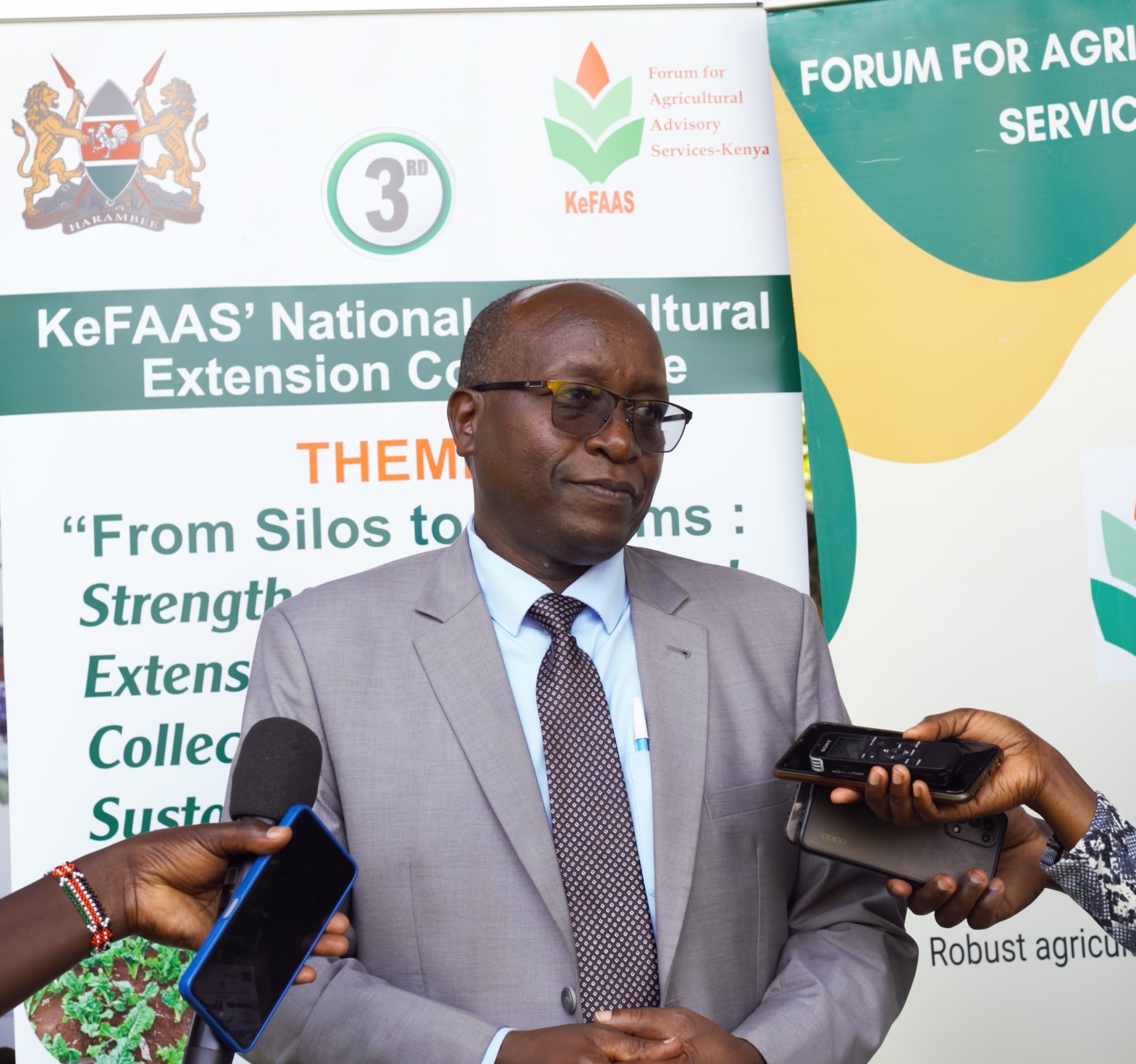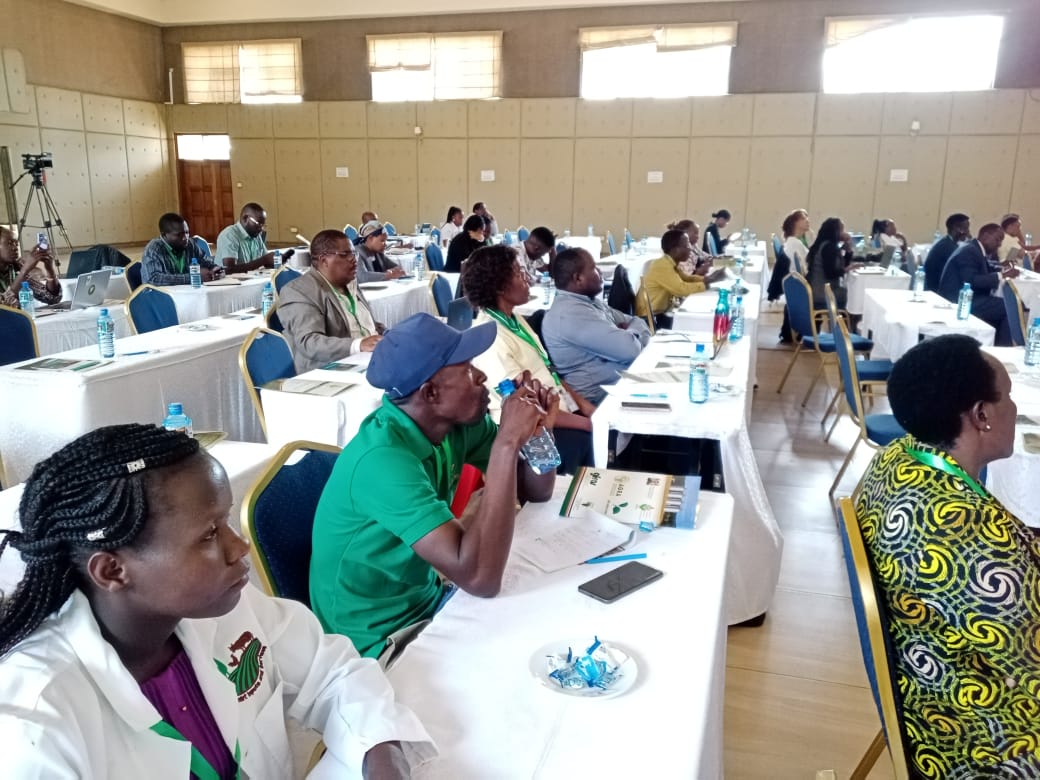
 Deputy director crop resource management division, Ministry of Agriculture, Leonard Kubok, addresses journalists during a two-day workshop for extension officers\HANDOUT
Deputy director crop resource management division, Ministry of Agriculture, Leonard Kubok, addresses journalists during a two-day workshop for extension officers\HANDOUTThe public and private sectors have been urged to enhance their collaboration to strengthen agricultural extension services for increased food production.
The calls to action were made on Tuesday during the third national extension conference held in Nairobi that brought together participants from the Ministry of Agriculture, county governments, agriculture training institutions, agriculture advisory firms, researchers and policymakers.
The two-day workshop was themed ‘From silos to systems; strengthening agricultural extension systems through collective actions towards sustainable food systems.’
Dr Lilian Lihasi, the executive director at the African Forum for Agriculture Advisory Services, said the adoption of partnership among key players is sustainable, productive and impactful in the long run as opposed to working as individual actors, which is exhaustive, unproductive and could lead to duplication of roles.
“When we say we are moving from working in silos, we mean that we are abandoning the art of working singly as actors in the sector and now embracing systems where we talk about partnership. Working in silos is very costly as each organisation is running up and down doing many things thus creating less impact, fatigue and duplication,” she said.
She termed insufficient food production, weak extension services, weak agricultural frameworks and policies as impacts of working in silos despite growing technology.
Lihasi said under a coalition of stakeholders through partnership, each player has a stake in the strengthening of its expertise that is responsive to farmers' needs and in order to achieve that mindset shift, institutional integration, investment shift and inclusive participation are needed.
She cited among other players policymakers, who help create an enabling environment for all players and the private sector that helps co-create solutions and business opportunities
Amid emerging and advanced technological discoveries, the abandonment of youth and women in extension agricultural services can lead to limited output.
“We need to leverage the digital potential in the youth towards advancing agriculture extension services while we also engage women who are the majority of the country's farmers in spreading resourceful information on better farming practices to fellow farmer,s as farmers to learn from one another.”

Peter Mwangi from Kenya Forum for Agricultural Advisory Services expressed the need to break the existing silos so as to address the existing gaps and ensure farmers benefit optimally from different stakeholders who for long have been “doing different things without coordination.”
He also challenged the county governments to engage more youth as extension officers due to their digital expertise and innovative abilities to boost farmers’ potential especially in the wake of catastrophic effects of climate change and emergence of crop diseases and pests.
“The financial allocation of each county varies depending on its need, though we are lobbying them to engage extension officers even as they prioritise subsidised farm inputs to the farmers.”
Olusola Adeyemo , lead practitioner for sustainable farming ,distribution and youth in extension in AGRA, highlighted the need to infuse digital systems in agriculture so as to attract as many young people as possible.
“At an institutional level, we are onboarding young people by presenting agriculture in a way that is appealing to them through use of technology. In addition, we are integrating them as policymakers by giving them a platform to make their voices heard because we believe they have a high stake in shaping the sector as far as this subject is concerned,” he said.
He also encouraged all players to adopt a coalition mindset, prioritise capacity building, knowledge sharing key in befitting farmers, as well as enhancing well-coordinated interventions and purpose-driven investments key in revolutionising extension services.
Deputy
director Crop Resource Management Division at the Ministry of Agriculture Leonard
Kubok said that despite the government‘s effort to entrench policies, extension services are
yet to be fully realised countrywide.
He maintained that despite extension services being devolved the policy development and rollout remain the function of the national government.
He highlighted a strained capacity in form of personnel, infrastructure and equipment as some of the major challenges crippling the efficiency of the extension services in the country.
“For quite a while we have had an aging workforce with very limited entry of new blood of employees at county levels mainly impacted with the reduced budgets that are meant to onboard fresher ,younger and energetic extension providers.”
He further attributed the challenge to lack a proper management succession plan, revealing that the largest intake of extension graduates was done by the national government in 2008 and a very minimal one five years ago.














